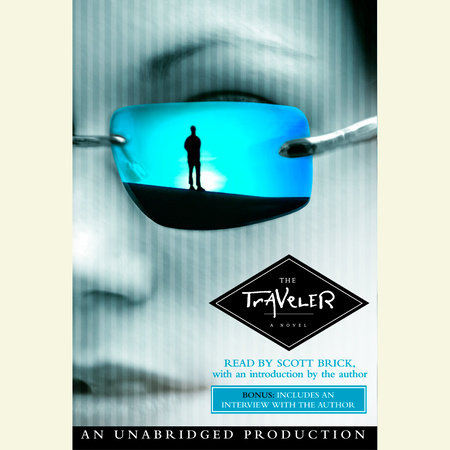The Traveler Reader’s Guide
By John Twelve Hawks


1. Maya has been trained since childhood to be a Harlequin, yet she chooses to live a normal life. What aspects of her upbringing play the largest part in her decision? In what ways does her relationship with Thorn exemplify the conflicts any daughter might have with a strong, distant father?
2. Are Thorn’s demands on Maya justified? Under what circumstances, if any, do children have a responsibility to renounce their own way of life and dedicate themselves to their parent’s cause? Why does Maya ultimately decide to honor her father’s request?
3. Discuss the meaning and ramifications of the Harlequin motto, “Damned by the flesh. Saved by the blood” [p. 22/mm 23*]. What familiar moral percepts or sayings embody the same or a similar message?
*Page references are provided throughout this guide for both trade and mass market editions; the trade appears first, followed by a slash and the mass market page reference.
4. Nathan Boone believes that he is “part of a historical battle against the forces of disorder” [p. 26/mm 27] and that “order and discipline were the values that kept Western civilization from falling apart” [p. 27/mm 28]. Can you cite specific periods or events in history that support this point of view? Does an emphasis on “order and discipline” necessarily lead to tyranny?
5. The Traveler is set in a world very much like our own. How accurately does the author describe the use—and possible abuse—of technology? Do any of the surveillance techniques the Tabula employ seem entirely far-fetched?
6. The Harlequin mentality requires “no compassion, no attachments, no mercy” [p. 72/mm 75]. Do the relationships among the Harlequins in the novel conform to this ideal? Can any group function successfully without the members feeling a sense of attachment to one another? Does the sharing of a common goal, for example, adequately explain Maya’s feelings about Mother Blessing, Linden, Willow, and even the traitor, Shepherd?
7. Dr. Richardson maintains, “while the priests continue to pray and the philosophers continue to speculate, it is the neuroscientists who are closest to answering mankind’s fundamental questions”[p. 79/mm 81–82]. Have you heard about or read studies that offer convincing evidence that scientists are on the brink of answering those questions? Has science rendered the insights of religious thinkers and philosophers irrelevant? Can a spiritual or philosophical approach offer an understanding of history and human behavior that science cannot replace?
8. From the central characters to the secondary figures, the characters in The Traveler make choices about how to use their individual power. Discuss the influence of their backgrounds, religious beliefs, and real-world experiences on the decisions made by the following characters: Maya, Nathan Boone, Kennard Nash, Lawrence Tawaka, Vicki Fraser. Are the Brethren motivated purely by self-interest and the desire for control? Are Maya and her supporters acting purely out of idealism?
9. Maya recounts the “secret history of the world” to Gabriel, Vicki, and Hollis [pp. 185–86/mm 191–92], identifying some of the Travelers who have changed the course of human history. Although it is based on the conceits of the novel, does Maya’s account present a credible interpretation of the forces that have shaped history? What makes her descriptions of Travelers and of the Harlequins persuasive?
10. In explaining the Brethren’s plans for him, Kennard Nash tells Michael, “These days people are frightened of the world around them, and that fear is easily encouraged and maintained. People want to be in our Virtual Panopticon. We’ll watch over them like good shepherds” [p. 237/mm 246]. Have leaders, both in America and around the world, taken advantage of the fear and uncertainty many people feel to impose their own political or religious agendas? If so, how?
11. Gabriel meets with the Pathfinder at an abandoned missile site. How does the physical setting embody the real terrors and challenges Gabriel faces? In what ways does it enhance the mythic themes that run through the novel?
12. Sophia calls the 99 Paths, “a practical list of ideas with the same goal: to break the Light free of your body,” allowing Travelers to enter the different “realms” or “parallel worlds” [pp. 324–26/mm 339–41]. Have you, either through your religious education or independent experience, encountered the idea that other realms exist? If so, is Sophia’s explanation consistent with your previous knowledge or beliefs? Whether or not you are a newcomer to this idea, do you find it to be a helpful or inspiring approach to spirituality?
13. The novel touches on many contemporary issues: the fear of terrorism and the role of the government in protecting the nation; the growing complacency of American citizens; the misuse/abuse of technology; and scientific contributions to improving quality of life for the individual and society as a whole. How balanced are the points of view the author offers on each subject? Are good and evil always clearly defined?
14. The narrative point of view alternates among the characters. Which character is the most realistically drawn? Who do you identify most closely with and why?
15. How does the plot of The Traveler follow the arc of a traditional thriller? What does it share with other science fiction novels you have read?
16. The Traveler is the first book in a trilogy. Which characters would you like to learn more about in future volumes? Are there other aspects of “the secret history of the world” that the author should explore?
Just for joining you’ll get personalized recommendations on your dashboard daily and features only for members.
Find Out More Join Now Sign In